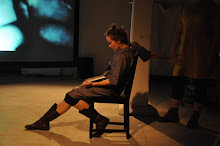I worry that I'm losing my memory. When I say this, I don't for a minute imagine that I'm alone. I know that there are scores of people out there with the exact same fear, and the exact same shocking, mind-decomposing data to back it up. However, when I think of memory loss, I exclude from this pool people who forget where they parked the car, or forget where they put their glasses or their keys. This is a different problem. Key forgetters and car forgetters don't have memory problems, they just have something better going on. Manufacturing and storing a small memory about where the keys are can't compete with other, bigger thoughts. You're coming through the door, and you're throwing down the keys. You're not thinking "And here I place my keys on the upper left-hand corner of the bureau next to the footstool." You're thinking WHERE IS THE BATHROOM or FUDGE ICE CREAM NOW. And because bathrooms and fudge are so much more riveting than watching keys drop almost everyone has this problem. It's called obliviousness. It has to do with memory, sure, but it has more to do with not being present for something. You have to pay attention if you want to remember. Someone very important could be saying "Hi, I'm Cornelius" to you, but if you're thinking "OH MY GOD DID I PUT ON DEODORANT" are you going to remember Cornelius, or the deodorant?
My favorite story about obliviousness comes from my mother. My mother is an avid reader of the
New Yorker magazine, and she frequently tells me I have to read a particular article. On this particular occasion, my mother was so excited to tell me about this article I had to read that she called me up on the phone. "Majel," she says, "you have
got to read this article from this week's
New Yorker." A lot of our phone conversations start this way. "Oh, yeah?" I say. "Who wrote it?" Now, bear in mind, my mother has
just read this article. As in, she put down the article and the very next thing she did was to pick up the phone and call me. She thinks for a minute, and she says, "Well, I never remember the names... but you just have to look at it. It's hilarious." "Well," I say, "what's it called?" She pauses. You can tell she's thinking. But something isn't happening. "Um." she says. She thinks some more. "I don't know." "But Mom," I press, "you
just read this article? What's the general premise? Like, what's it about?" She can't remember. Now, my mother would say she has memory problems. (And, in fact, I concur.) But in this particular case, something else is going on. Clearly, my mother was excited reading the article. Clearly, she read it cover to cover. Why can't she remember
even what the article was about? She wasn't present for the article. She flew through it, but she forgot to
think about it. If you're not thinking about something while you're doing it, you're not really owning it. Your brain skips over what it's doing like forgetting to hit the record button.
But the kind of memory problem I worry about is different. It has to do with information that isn't five minutes old, but information that is really old, that's been there for months, or years.
When I was younger, I remember feeling very acutely that I didn't have the vocabulary I needed to express myself the way I wanted to. In particular, I remember this because there was a guy I had a big, huge crush on, and this guy was an ace at telling you what was on his mind. I was the exact opposite. I would try to squeeze my brain to get the right words to come out, and nothing would come out. So, later in life, in college and after college, I became a word hoarder. I had words for everything, rare words, words in other languages, words that no one you knew had ever heard of. I used words like a cook uses condiments: a dash of Double Entendre, a drop of Irony. I could see Shy + Flirty + Biting Sarcasm working well here, or maybe I'll deploy Brash + Inappropriate + Hysterical...
Lately, though, sometimes I put the squeeze on the brain and I only get half a word, or the wrong word, or worst of all, not the word. When you think about how words get from the brain to your mouth, it's not a process you can really put your finger on. It's kind of like the old drive-thru way of getting money from a bank. You're you, and your brain is the bank. You pull up, you put your request in a container, shoot the container over to the small people behind the glass, and then they shoot it back to you. You put "Hey, uh, could you..." into your container. And then the container comes back and it says "DEBILITATING." And you're like, "Oh, yeah! Debilitating." Thanks, Brain! But when the process doesn't work, it's like pulling up to the bank at one o'clock in the morning when it's dark and no one is working. You keep trying to hit the button on the container, but it just stays there, empty. Not going anywhere. No words.
More and more I pull up at the bank only to discover it's one o'clock in the morning, and I am S.O.L. Maybe I'm tired. Maybe I got too much sun. Maybe I just watched two straight weeks of the Olympics. But how many times can you pull up to the bank in the middle of the night before you have to conclude you're losing your mind?



